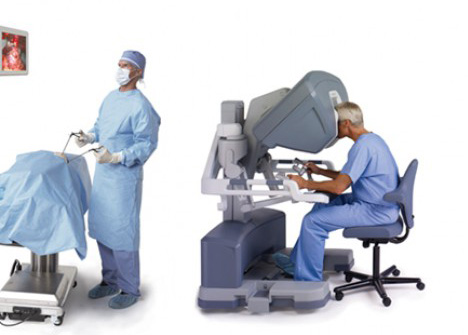In the News
Another first for da Vinci and Mediclinic Durbanville

While da Vinci robotic surgery is nothing new to Mediclinic Durbanville, with prostate surgery being performed since 2013, the advancement of skills amongst fellow surgeons has opened doors for a new range of confined space surgeries such as pelvic floor repairs and rectal cancer surgery. Both Dr Frikkie Rademan and Dr Reniel de Beer have recently undergone the rigorous training to certify themselves on the da Vinci robotic system.
Hillary Nortje, who was the first patient to undergo this robotic pelvic floor repair at Mediclinic Durbanville, is not new to these types of surgery done in the traditional and laparoscopic way. She underwent an initial pelvic repair several years ago with another surgeon, which was unsuccessful, as well as later undergoing a successful bladder operation. She explains her approach to the surgery, “After my initial operation I was reassured that the results would be a lot different this time round. Dr Rademan advised me to wait for the robotic option in my case and I am so happy I did. While I was apprehensive before the procedure the staff and doctors at Mediclinic Durbanville were so eager to explain each step of the procedure and the reasoning behind them. It was less invasive, my recovery was so much quicker and I only experienced a little discomfort from the incisions rather than actual pain. I am hoping that soon I can get back to a little gentle trail running or spinning which I have not been able to do for the last two years.”
Another first for da Vinci and Mediclinic Durbanville
New angle on pelvic floor disorders

As you drive north, up the N1 highway from Cape Town, you’ll pass Mediclinic Panorama – a hospital which offers excellent cardiovascular care. On the other side of the Tygerberg Hills you’ll find Mediclinic Durbanville: a newer hospital, but one which is already emerging as South Africa’s top pelvic hospital. One of the doctors behind this is Dr FJ ‘Frikkie’ Rademan, a specialist surgeon with an innovative approach to pelvic floor repair.
Nearly 25% of women experience pelvic floor problems, and those problems can be embarrassing and painful, with complications like prolapse resulting in symptoms like urinary or faecal leakage, constipation and difficulty with intercourse. When he operates, Dr Rademan uses laparoscopic surgery – a keyhole procedure which has him inserting a laparoscope (similar to a telescope) through a small incision to give him an on-screen view of the pelvic floor. Then, via three incisions in the patient’s abdomen, he uses instruments to lift and reattach the prolapsed organs using a mesh.
